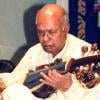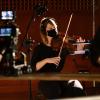
Concerto concerts are a programming staple for early-music groups. This was the dominant orchestral form of the symphony-less Baroque era. But to actually make these pieces come alive, you need soloists who step up and seize the audience’s imagination — and maybe leave listeners breathless. For its Friday night concert for the Berkeley Festival and Exhibition at First Congregational Church, Voices of Music had two such soloists in a program of concertos by Antonio Vivaldi and arias by Handel.
The vocal works fit right in: Handel wrote plenty of concerto-like arias, and on Friday, soprano Amanda Forsythe made a whole meal of a few of them. Forsythe has a notable career and 25 albums behind her, including the role of Euridice in Marc-Antoine Charpentier’s La descente d’Orphée aux enfers with the Boston Early Music Festival, which took the 2015 Grammy Award for Best Opera Recording.
I suspect she chose her first aria, “Il volo così fido” (A truer flight) from Riccardo Primo, to show off her perfect trill: light, fast, and seamlessly woven into a legato line. The aria’s metaphor of a bird flying home to its nest required trills in abundance. Joined by Hanneke van Proosdij on sopranino recorder (which the English called the “bird flute”), Forsythe was expressive even when flying off into roulades.
The other Handel arias came in pairs: a shorter and lyrical selection, then a faster and virtuosic one. So, in the final pairing, we heard two of Cleopatra’s arias from Giulio Cesare, “Piangerò la sorte mia” (I shall lament my fate) and “Da tempeste” (If a ship is battered by a storm). The technique on display was extraordinary. The soprano’s breath control resulted in a razor-fine pianissimo in every register and a wide dynamic range that helped shape everything she sang.
But the whole effect was more than the parts. Forsythe was a star presence, often bending from the knees, as if drawing the sound up with her entire body. Occasionally she’d shoot the audience a sidelong glance as she prepared to slay us with another fusillade of 16th notes. Duly warned, we were still bowled over.
Vivaldi had to have been a shredder, VoM co-founder David Tayler commented to me; the composer was known for pyrotechnics, not philosophy. In violinist Augusta McKay Lodge, VoM has a soloist who not only shreds but has a titanic sound. McKay Lodge plays with a rounded and beautiful tone, certainly, but she can also overwhelm with volume and raw power. And this is on a Baroque violin, supposedly less bright and loud than its modern descendant. McKay Lodge often appears with VoM, and she’s worth a special trip to hear.

She stepped into the solo role for Vivaldi’s Concerto in D Major, RV 208 (“Il Grosso Mogul,” apparently named for a libretto of the time). Plunging into the first movement’s extensive bariolage (alternating notes played on adjacent strings), McKay Lodge created such contrasts in sound that the stopped-string melody and the open-string ostinato seemed to be played on different instruments. The impressive cadenzas were copied from an anonymous manuscript, which Tayler and van Proosdij found online. Judging by how much time these cadenzas spend in fifth position, they’re either by Vivaldi or by someone who wanted to sound like him; McKay Lodge tossed them off with ease.
She then moderated her sound in order to blend with Isabelle Seula Lee in the Concerto for Two Violins in A Minor, RV 522. While the performance of the outer movements was impressive, the jewel was the pair’s sweet connection in the work’s unforgettably beautiful Larghetto.
VoM’s regular players are capable of solo turns, such as cellist William Skeen, who opened the concert with a fine if self-effacing performance of the Cello Concerto in D Minor, RV 407. But van Proosdij, who presides over the group from the harpsichord, has a soloist’s ability to take the stage, which she did, again on sopranino, in a lively rendition of the Recorder Concerto in C Major, RV 444.
But to sample what van Proosdij is capable of, you’d have to have been at one of VoM’s concerts back in March, when she played a concerto by Georg Philipp Telemann in which the composer tries to kill the soloist with finger-busting runs and several high As, which van Proosdij accomplished by bringing her knee up to close off part of the end of the recorder, raising the pitch. “The composer wrote it, I have to play it,” she said with a little false modesty. If you need someone to shred on the recorder, you know who to call.




